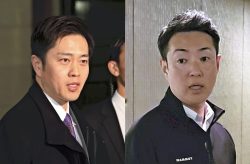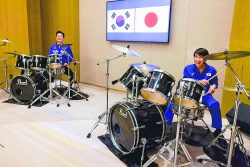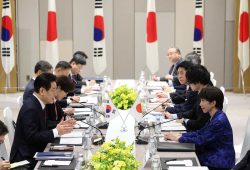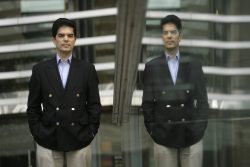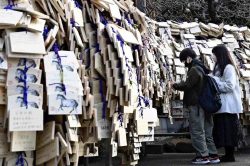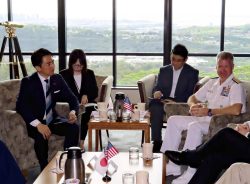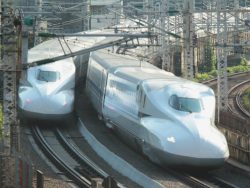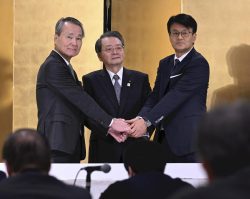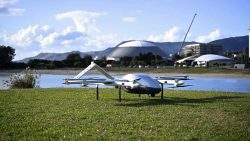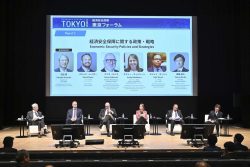Suga needs to be aware Biden’s policy places U.S. economy 1st to counter China
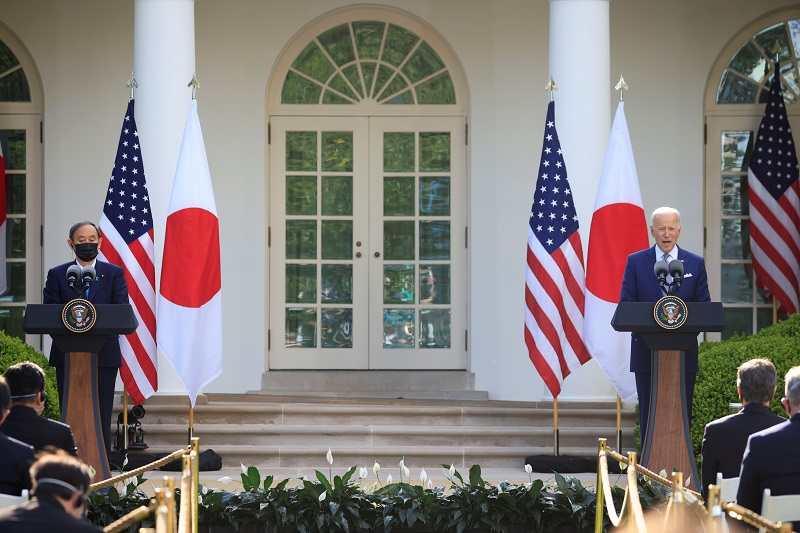
Japan’s Prime Minister Yoshihide Suga and U.S. President Joe Biden hold a joint news conference in the Rose Garden at the White House in Washington, U.S., April 16, 2021.
16:53 JST, April 19, 2021
WASHINGTON — U.S. President Joe Biden has described China as “the only competitor” and his administration’s policies toward Beijing are not limited to security and diplomacy. The thinking in Washington is that it is necessary to work with democratic nations, especially allies such as Japan, in a wide range of areas, such as the economic and the science and technology fields.
The Japan-U.S. summit on Friday marked the first step.
At a joint press conference with Prime Minister Yoshihide Suga held after the talks, Biden spoke of “the technologies that will maintain and sharpen our competitive edge.”
“Those technologies are governed by shared democratic norms that we both share,” Biden said. “Norms set by democracies, not by autocracies.”
Biden then continued to lay out a range of fields that the two leaders agreed to work together: promoting the high-speed, broadband 5G communications standard; increasing cooperation on supply chains for semiconductors and other critical sectors; and conducting joint research in areas such as artificial intelligence, genomics and quantum computing. In each of these areas, Washington has countering Beijing in mind.
The United States wants to raise the level of technological capability among democratic nations while at the same time rebuild supply chains to reduce its dependence on China regarding semiconductors and other important products to win the battle for supremacy. This is the blueprint drawn by the Biden administration.
Japan’s dependence on China remains high, so it is not going to be easy. After Biden’s remarks, Suga simply stated, “Under the recognition that the digital economy and new technologies, in particular, will bring about social transformation and huge economic opportunities, we have agreed that Japan and the U.S. will work together.”
Among important strategic goods, Japan imports from China a much higher percentage of semiconductor components, pharmaceuticals and batteries than the United States.
There is no objection to rebuilding supply chains, but if the United States escalates its demands and asks Japan to decouple from China, it will be difficult to do so.
In the U.S. strategy toward China, Washington’s notion that its own interests come first can be sensed. The Biden administration has touted “advancing a foreign policy for the middle class” and is keenly aware of voters in states with large manufacturing workforces ahead of next year’s midterm elections.
The agreements reached by Japan and the United States and stated by Biden at the joint press conference closely resemble those in the infrastructure investment plan that Washington announced in March, suggesting Biden’s intention of using diplomacy to create jobs domestically. The U.S. administration plans to spend about $2 trillion over an eight-year period in the plan.
There are concerns within the Japanese government over some possibilities that Washington will make excessive demands on Tokyo, then eventually compromise with Beijing to prioritize the U.S. economy, thereby placing Japan in an isolated position.
The government must find the best solution for Japan and the region while making sure to avoid marring Japan-U.S. ties. The Suga administration is being called upon to adopt a tough diplomatic strategy.
"Politics" POPULAR ARTICLE
-

Japanese Language Requirement Eyed for Permanent Residency Status; LDP Plans Revisions of Laws on Foreigners
-
-250x167.jpg)
Japan Eyes Plan to Accept Up To 1.23 Mil. Foreign Workers by End of Fiscal 2028
-
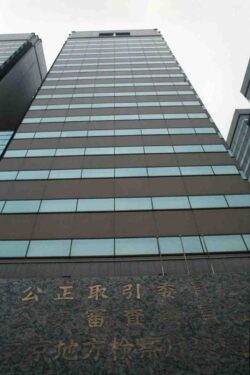
AI-Driven ‘Zero Clicks’ Phenomenon Threatens Democracy; News Outlets Must Be Able to Recover Costs, Stay Independent
-

Japanese Public, Private Sectors to Partner on ¥3 Tril. Project to Develop Domestic AI, SoftBank to Be Key Firm Involved
-

Japan’s Defense Ministry to Extend Reemployment Support for SDF Personnel to Age 65; Move Comes Amid Ongoing Labor Shortage
JN ACCESS RANKING
-

As Chinese Tourists Shun Japan, Hotels and Stores Suffer
-
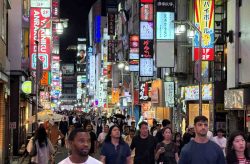
Core Inflation in Tokyo Slows in December but Stays above BOJ Target
-

BOJ Gov. Ueda: Highly Likely Mechanism for Rising Wages, Prices Will Be Maintained
-

Osaka-Kansai Expo’s Economic Impact Estimated at ¥3.6 Trillion, Takes Actual Visitor Numbers into Account
-

Japan Govt Adopts Measures to Curb Mega Solar Power Plant Projects Amid Environmental Concerns


